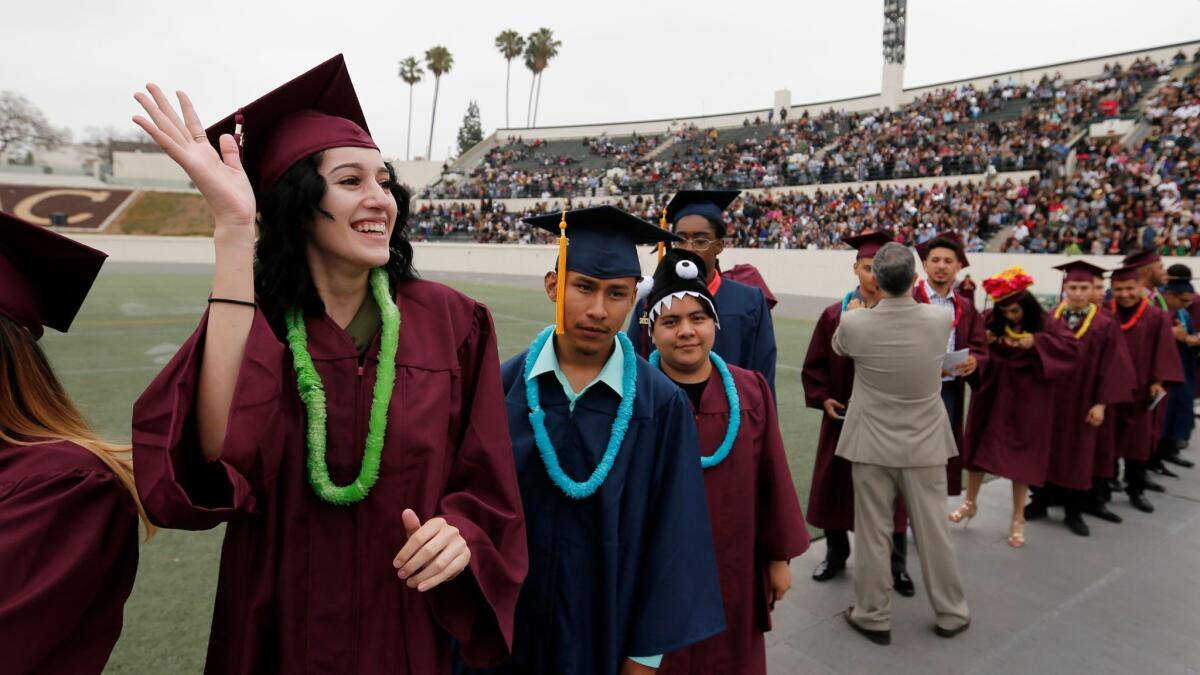High school students are graduating, but are they ready for what’s next?

- Share via
High school students in L.A. Unified are graduating at higher rates than ever before. But it’s too early to know whether these students will go on to complete higher-level education or succeed in the job market.
Now one of the school board’s new members wants to try to answer these questions by gathering and publicizing a lot more information, both on graduates and current students.
On Tuesday, the Los Angeles Unified School District board is scheduled to vote on a resolution that would give the superintendent four months to compile a report on student trends far beyond the graduation rate — including preschool performance, success on a host of standardized tests, and achievement in college, apprenticeships and vocational programs.
“We’ve got all this progress that we’re making on high school graduation rates but as we keep pushing toward that 100% graduation, we can’t forget the college- and career-ready part,” said board member Kelly Gonez, who wrote the resolution. “We’ve got to make sure that our diplomas mean that our kids are prepared for success long-term.”
Some of this data is readily available. A recent analysis of college persistence rates for L.A. Unified high school graduates, for instance, found that although about 70% of graduates enrolled in a two-year or four-year college within a year of graduation, only a fourth earned a degree within six years. But the most recent six-year tracking available for that study was for students who graduated from L.A. Unified in 2008.
The resolution directs the district to set up partnerships to ensure that L.A. Unified graduates’ progress will be tracked through higher education institutions in California.
The school district has seen a sharp increase in graduation rates in the last few years, thanks to an “all-hands-on-deck” campaign spearheaded by new Supt. Michelle King.
Her efforts have including ramping up controversial “credit recovery” courses to help students make up classes quickly so they can graduate on time. Some question the rigor of these courses, and whether the students who take them truly are mastering the subject matter.
Board member George McKenna co-sponsored the resolution, asking Gonez to include a measure that would direct the superintendent to examine the possibility of paying for all students to take the PSAT exam each year in grades 8 to 10 before they’re required to as high school juniors. It would be one way to combat inequity in school outcomes, McKenna suggested at the Aug. 22 school board meeting. Wealthier students tend to get PSAT and SAT coaching in earlier grades so they have an advantage over the ones who see it for the first time in 11th grade.
“You’re not expected to pass it in the eighth grade but you get exposed,” McKenna said during the meeting. ”By the time you get to 11th grade … you’ve seen it several times so you don’t faint when they say, ‘Ready, begin.’”
That’s one of a number of measures that the superintendent would need to look into, and determine the costs of, if the resolution passes. It also calls for college centers on every high school campus, and an online platform that would provide students help with applying to college and making the transition from high school.
Beyond gathering the data in one place, Gonez wants teachers and parents to be able to see it, she said. The resolution also asks the superintendent to examine the feasibility of making all the data publicly available online, and including it in plans to improve schools.
“Parents should have the full information about how their schools are performing and be able to compare between schools,” Gonez said.
Reach Sonali Kohli at Sonali.Kohli@latimes.com or on Twitter @Sonali_Kohli.
More to Read
Sign up for Essential California
The most important California stories and recommendations in your inbox every morning.
You may occasionally receive promotional content from the Los Angeles Times.











